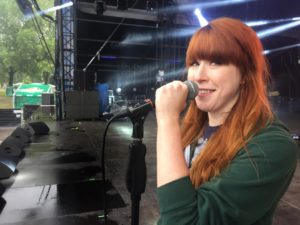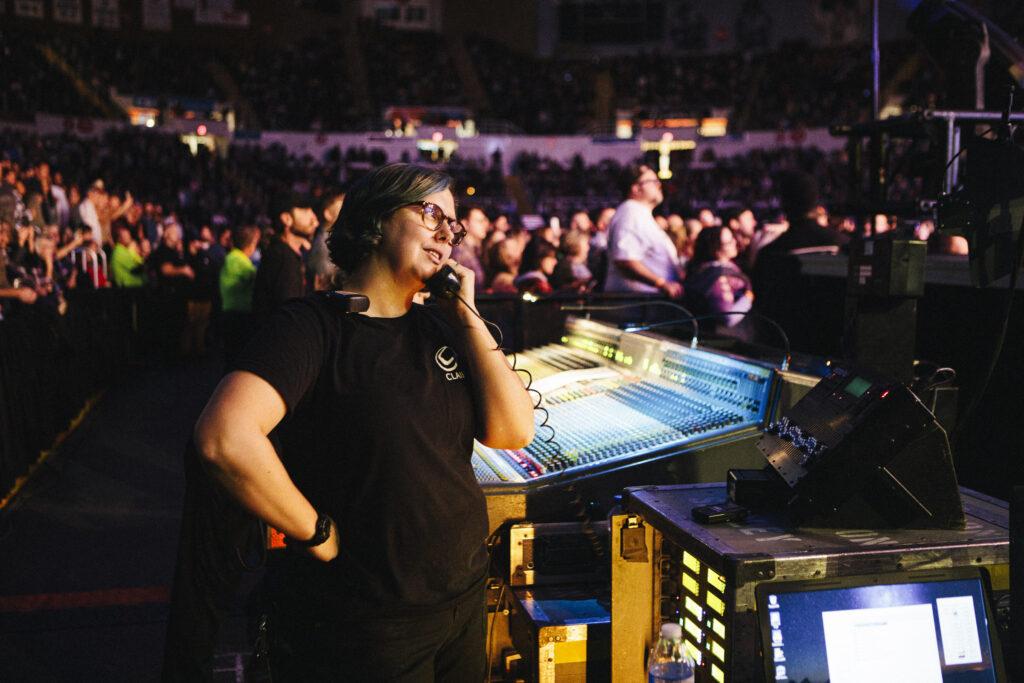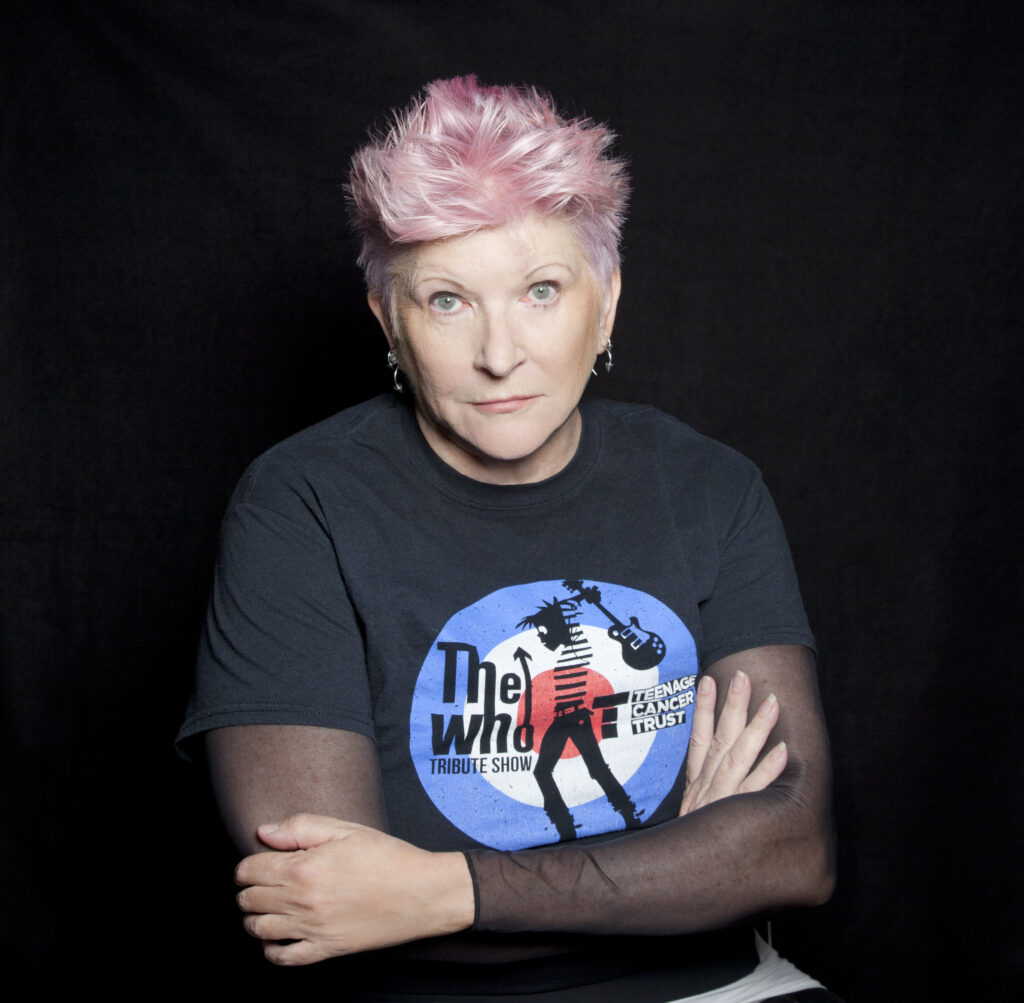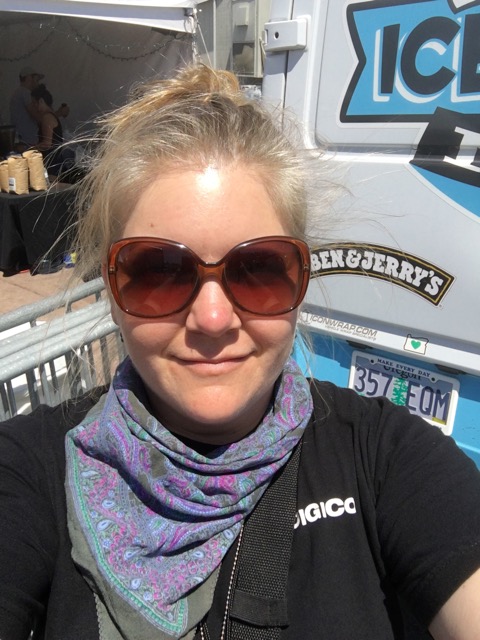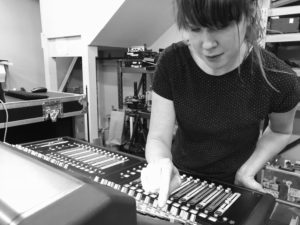
Robin Kibble is an independent live sound engineer taking the reigns of both FOH and Monitors. Based in Seattle, she has been working in live sound for the past 12 Years. She has a wide variety of live experience between touring and freelancing in town with The Showbox, Carlson Audio, The Neptune Theatre, Morgan Sound – to name a few. Robin has toured as FOH Engineer with Julia Holter and TR/ST, The Knife as an audio tech, Tenacious D as a monitor engineer and more.
Robin’s interest in live sound started when she was told “it was something that “girls” couldn’t do, and I was confident it was a language I could learn to understand – especially coming from a music background. Then I started to do it and fell in love with it.”
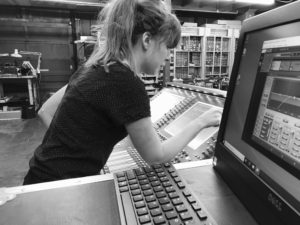 She would enroll in a live sound workshop at the Vera Project. VERA is an all-ages volunteer-fueled music and arts venue that engages participants at all levels of music production and community organizing. Vera’s programs are always all ages, with a focus on young people ages 14 to 24. Vera offers programs in music concerts, audio engineering, visual art exhibits, live and studio recording, leadership training, silkscreen printing, event production training, and internships.
She would enroll in a live sound workshop at the Vera Project. VERA is an all-ages volunteer-fueled music and arts venue that engages participants at all levels of music production and community organizing. Vera’s programs are always all ages, with a focus on young people ages 14 to 24. Vera offers programs in music concerts, audio engineering, visual art exhibits, live and studio recording, leadership training, silkscreen printing, event production training, and internships.
Robin then would go on to volunteer with Vera and would start interning at a mid-size club in Seattle, where she gained experience by trial and error, observation, and The Sound Reinforcement Handbook. She would get a break one day when the venue did not schedule a monitor engineer and the touring act that was booked required one. Robin was thrown into the hot-seat and survived. This caught the attention of the house production staff, and from there she started getting paid shifts. From there the opportunities just kept growing.
Robin’s education in audio was all hands on, on the job training. She was fortunate to work with Josh Penner, whom she considers a mentor. ” He invested in me and improved upon my training. He answered any questions I had thoroughly from the simple to the complex and never made me feel stupid for being curious or needing more information. He answered a lot of the “whys” behind what I had discovered through trial and error. ” Robin believes this was the best education saying “that if you’re starting out, interning at a legit audio company is a great way to go about it. I say this because some of the best in the biz that I’ve met come from that background.”
What if any obstacles or barriers have you faced?
I have dealt with sexual harassment in our field. An example of this would be being taken off of a schedule because I didn’t want to date my boss. I have been paid less at a venue, while having dramatically more qualifications, than a guy working there. In more than one environment, being assertive and standing up for myself when my needs haven’t been met has been met with a resistance that I genuinely feel I wouldn’t have encountered in the same way if I was a guy.
How have you dealt with them?
I see even these obstacles as opportunities because I don’t want to work with people that will demean me, or diminish my quality of work. I feel like, in starting out, it’s harder to say no to potential work experience, but if it’s at the risk of damaging your integrity and self-respect it’s not worth it. There will be jobs where you are treated well and will find great mentors. The industry is changing (in a positive way, I believe) from when I started, and there are real support systems in place now. Like SoundGirls!!
Advice you have for other women and young women who wish to enter the field?
It’s both who you know and what you know. Learning and knowing you’re not always right is a power skill. Say “yes” when you’re provided with the ability to learn and thrive and say “no” otherwise. Trust your gut about what’s best for you, Communicate with others about what you want to achieve. If anyone tries to throw you under the bus because of their insecurities, try not to take it personally, and learn what you can from any situation you encounter, even if you feel it’s negative. You will meet good people along the way (most people in this industry I’ve met are).
Some of the best advice I’ve received regarding touring was learning how to pick tours. The advice involved paying attention to three things:
- If you like the music,
- If the money’s good,
- If you like the people.
If two out of those three things are a match for you, the tour will fit. If not, move on. I’m human, so with the knowledge, I’ve had at the time, I have made good and bad decisions on this front, but it’s a good starting point for choosing work.
Must have skills?
Good communication, a positive attitude, patience, self-care, and resilience. Understanding signal flow is also crucial.
Favorite gear?
For the any case scenario: my Skeletool Leatherman, a click mic for talkback, gaff tape.
Favorite monitor wedges are L’Acoustics 115XT HiQs. I also love an L’Acoustics PA.
Favorite console would be a Digico for the sound.
For IEMs, I’m currently on Ultimate Ears.
What do you like best about touring?
Learning new things, traveling to unique places I may never see otherwise, the connections made with band and crew, the food.
What do you like least?
Lack of sleep tops the list. And sometimes I get a bit lonely. I miss my friends, family, and bed.
What is your favorite day off activity?
Exploring a city for good restaurants, cool sights, etc. And naps.
What are your long-term goals?
My long-term goal is happiness, and professionally for me to achieve that I’ve been focusing on being selective about the work I take. Although money is of a course a factor, my dream is to work exclusively with badasses that are kind, fun, and good at what they do – both in band and crew capacity. I’m also always stoked to learn new things. I’m grateful for those challenges. I see them as opportunities. A good example of the kind of tours that met those long-term goals was with The Knife. It was a pretty much flawlessly organized tour, and every single person, artist and crew member alike, brought something great to the team. I feel like I became a much better tech on that tour as well (shout out to Laura Davis, our monitor engineer, for being such a stellar work companion on that ). It was also really heartwarming to be surrounded by such positive, inclusive energy on tour. Every single person cared about what went into that show. It’s something I felt super proud to be a part of. I also wanna give a shout out to other workplaces and tours, because I’ve had a lot of great experiences actually, but that was next level stand out.

